No expectation, no attachment, no judgement: an interview with Genesis P‑Orridge

this conversation happened right before Psychic TV concerts in late May, 2014 in Russia.
it’s really nice to hear you, first of all I want to thank you for your life and all the things that you’ve done, it’s really inspirational for all of us
well, thank you, it’s great to hear
as you’ve probably heard in the news, we’ve got a really strong political situation here, all the things with the Crimea and a crisis too
yes, it’s tragic, it’s so sad, so difficult
and in my opinion, it really makes it more actual than ever, some of your teachings and ideas, some of the Temple of Psychic Youth ideas, but okay.. about a year ago, you talked about a project of a shelter for artists in some interview, as I remember, it was something about a house in some southern country, I can’t remember what country it was exactly
ever since.. gosh, since we were probably maybe 7–8 years old, my school took me to some-where called Anglesea, it’s an island in the north of wales, and we stayed in a cottage and it was an art trip so the whole time we were just making art and there were lots of prehistoric sites, stone circles and prehistoric villages, and we just thought «wouldn’t it be great to have some-where like this all the time?». and then when we dropped out of university in 1969 it was to join a commune in London, The Exploding galaxy, and everybody’s money was put into one box and everybody’s clothes went into another box, and all the walls were knocked down so that when you went to the toilet or had a bath everyone could see you, we took turns cooking, and…
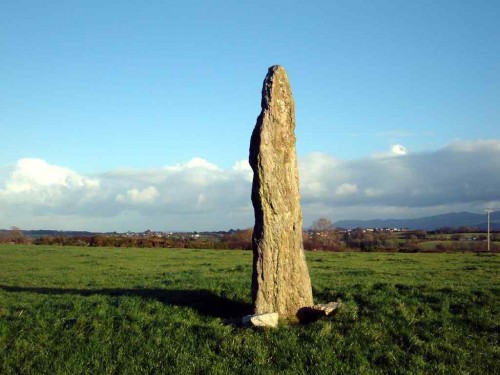
yeah, complete transparency…
yeah, so.. that had a really profound effect on me, the basic idea was to break down habits, to sort of make you think about why you do everything, why do you eat with a knife and a fork, why not chopstick, why not fingers, why not something totally new, you know, why is your head the same today as it was yesterday, where is your imagination, what happens when you get clothes that aren’t for you, clothes that are for the other gender, how’d you deal with that, you create new characters, does it change how you deal with the world outside, so it was all about con-stantly analyzing the self in order to build yourself from your own ideas, to create your own story, your own narrative rather than any inherited life, not what the family wanted, not what the society wanted, not what politicians wanted, not what money made or made not possible, but what was it that you wanted to become as a being and how to try and maximize that happening.
so that was right at the beginning, and those ideas have stayed with me in various forms and extended into more and more ideas ever since, and so we’ve always you probably noticed we always were in collaboration with other people, with groups rather than always doing solo things, because we’ve always felt – four brains, four imaginations, are more exciting than one, and what my mind can imagine I already know that, but what would be great would be to find out what other people imagined and see if that’s even more exciting or maybe the two together made something completely new, so it’s building this state of constant open-mindedness, al-ways ready to change, always ready to adapt, always ready to see a different version of the story of what’s happening around you. and of course that’s very liberating but it also challenges the basic structures of power in most societies because they’re all based on reducing your op-tions, reducing your choices, discouraging difference, discouraging you from doing things that are not what everybody else is doing, everything Other is a threat, anything that challenges the status quo is seen as a threat and how is it usually dealt with? intimidation by politicians, peer groups, by bullies, by the army, but always intimidation, the threat is always violence, the threat of being put in prison or punished in some way.
so this idea of punishment is always in all socie-ties and it just seems the most negative way to build a new society that’s based on positive creativity, the process of thinking, the learning of sharing, of giving, of generosity instead of self-ishness and bigotry and hypocrisy and prejudice, all those things that somehow seem to always go along with power structures.
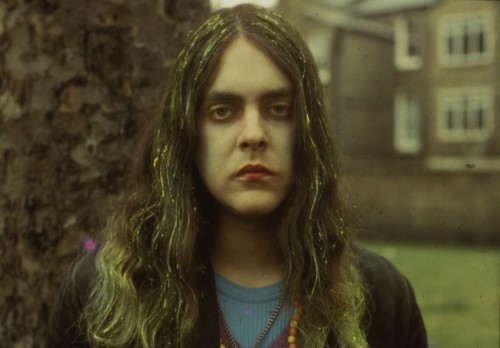
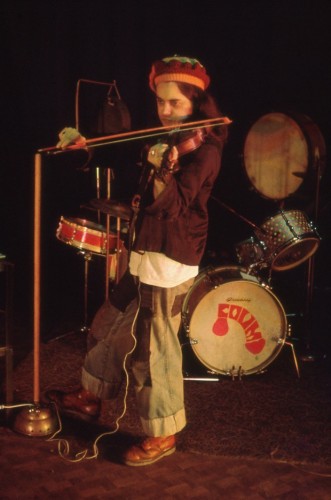
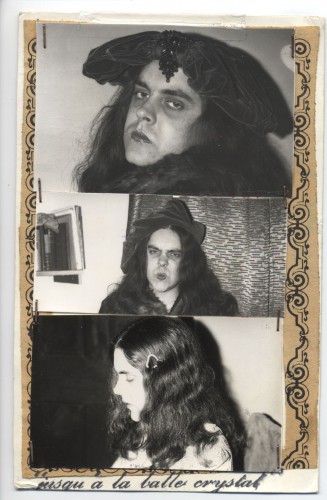
yeah, and i want to ask you, you completed the full circle: you explored a huge range of ideas and paradigms and now you’re back in time, back in the sixties, you’re playing psychedelic rock with your band, it’s really great
thank you, yes, funny how that happened, isn’t it? we’ve noticed it too, but that was the crucible but so much, as we were saying, we were so profoundly influenced, it was a moment in history that’s so rare, where everybody was talking about new possibilities, new waves of living, com-munes, communities, tribes, free love, jesus freaks, buddhism, you know, everything was up for grabs and it was considered a positive quality to explore.
but now that’s seen threatening by the status quo, by the establishment. and so, inevitably, you start to look at it again: now, what was it about that era that had so much influence and so many things grew from it: gay rights grew from the 60s, health food, alternative medicine, all these things have grown from that, and peo-ple forget.. they go like: «oh, the sixties failed!». but it didn’t, they’ve completely redesigned a huge part of modern life…
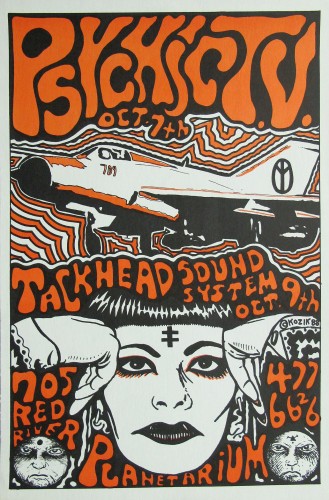
yeah, its influence is obvious, but what do you think, what do you feel about.. is it possible to repeat such an experience now, in the new era?
you know what, that’s the real, that’s the big question.. you’re asking great questions, by the way.. you know, that’s one of the things we’ve been pondering. you asked about the project, and we realized when we were thinking about it, initially of a big house that would be more of a commune, it dawned on me that communes that we’ve lived in, and we’ve lived in several over the years, the problems always grew in the bathroom, people didn’t clean up, in the kitchen, people ate each other’s food and didn’t wash up, and in the sense of needing privacy some-times, needing your own space.. so we adjusted the concept, as it is now, a village, a small vil-lage, an autonomous village, so you would still have a big house with a big kitchen..
a small village, you say, but how many individuals would there be?
that would remain to be seen, people who are truly dedicated, which is not that many, not many people, when you say, okay, say we got 8 people, for argument’s sake, each has a car, you don’t need 8 cars, so let’s get rid of six, and people go: «oh well but i want to keep my car», and then they immediately go like «do i have to give up something of mine?» and that’s where the change happened, people are really self-obsessed now, they want careers, the most common thing young people say to me is «I want to be rich and famous» and you say: «for doing what?» and they go «i don’t care, i just want to be rich and famous», it’s just ludicrous..
yeah, it’s really horrible..
and you know, and «i’d love to be in that village and have my own small building, cottage, a yurt, whatever it might be, but i don’t want to give my money to it, somebody else has to pay for eve-rything» again, it’s not going to work, so finding people that truly are prepared to give everything to it, it’s hard
yeah, everyone needs to take a part, to participate.
yeah, you need your own private space, so you imagine almost like a big building with satellite buildings around it, each one for a couple, a family or an individual, so it’s like a village, you can always have your own private time and your own space, but you can also be with the entire community in the big house and one of the great times for ideas we’ve found with the temple of psychick youth, TOPY, was meal time. every Monday, all the people in Britain, which was about 30, would meet and have a meal together, and one of the houses would cook, and the other would clean, and then we would discuss ideas, issues that would come up, things that people were unhappy about, things people have read about and thought everyone ought to know. and we also had a thing where every week everyone would tell their life story, and they would tell it all, completely, even the unpleasant parts, and it..
a personal story, you mean? a personal story of a human herself?
yeah, exactly, and by doing that, by trusting everybody with your inner story with all the things that have happened that were bad, people’ve been raped, it was surprising, something like 50% of the women have been raped, 30% of the men have been sexually abused, it was alarming. and once you’ve shared all that, you realize why peoples reactions are how they are sometimes. you know, «oh, this person gets upset because of what happened to them», so you start to un-derstand each other better, you grow empathy and sympathy and trust. and then the british government tried to shut me down and force me into exile, not one person in TOPY said any-thing negative about me.
one more question here, but where is the line between the quantity of people, individuals gath-ering together and doing their own things? as i remember, the temple of psychic youth, at the end of its era, it contained about 10,000 members, but the people who really lived together and practiced an alternative way of living.. so how many lived together?
not all of them lived together.. of the ten thousand worldwide, probably three or four hundred that were living communally.
so, did they draw the government’s attention?
well, the government did not like it at all, because it was growing and because we were also.. between all of us, we had book publishing companies, we had record labels, we were organiz-ing events, film festivals, raves, we closed the dolphinarium down, we were into animal rights, we had a shop that we gave everything away, for free.
so it was like the thing that Hakim Bey later labeled a temporary autonomous zone?
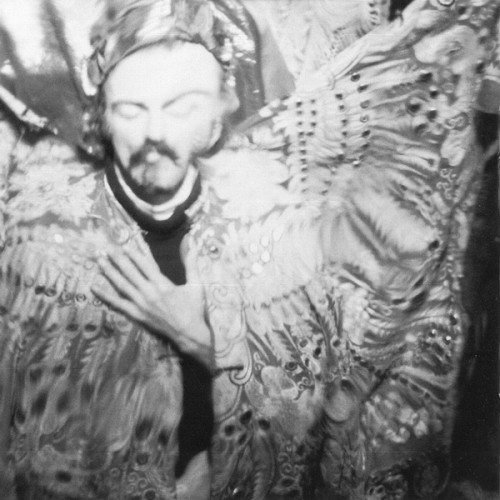
yes, exactly! that’s a beautiful phrase because it really explains a lot. and now it’s much more difficult because all the governments everywhere, in Britain for example, they made laws that made it impossible to squat, and in america they ended squatting.
you used to be able to go to bread shops and butcher shops and after closing time, and they would give you free food be-cause they couldn’t sell it the next day, they made that illegal, so the food is thrown away, lots of things like that.. if you’re in a squatted building, the town council had to give you electricity, they changed that law, so they kept on closing down different strategies that made it possible to live at least to a large degree, outside the status quo, and that made life so much more difficult, so much harder, there’s less money around, things are more expensive, and the ability to get free resources has been drastically reduced, certainly in america and most of Europe.
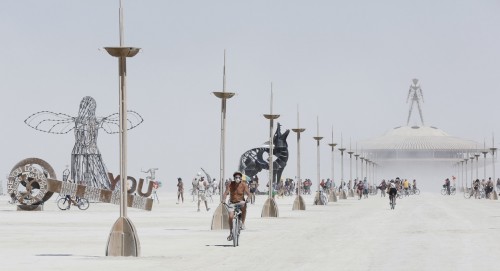
so, in a way, it’s much harder today to repeat the same experience, but it’s possible, so there’s a question of figuring out how to do that.
yeah, we have to find people who have, for example, who already have, at least some of them already have houses, they agree to sell all the houses to buy the land for the village, for the community, and that’s going to be very special people and it would take time. we’re always look-ing for people that we feel are sincerely prepared to experiment with a radical change in the way they do life. and that would, if we could leave any legacy behind, it would be a community. if we were rich, if we had millions of pounds or dollars or whatever, we would do it, we would pay for everything ourselves, but we don’t!
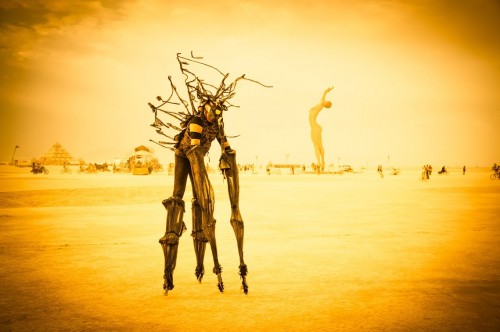
yeah, you need just one rich man that understands your ideas, but i think they might be extinct, if they ever existed.
yeah.. there’s a group we know that are called The Institute of Ecotechnics, and they started in San Francisco in the 66, an experimental street theater group called The Theater of All Possi-bilities, and then when they were, some of them were traveling in New Mexico, they met this hippie guy, whose nickname was Mad Cat, who turned out to be Ed Bass from the oil family in Texas, billionaire, and Mad Cat financed them building a village in New Mexico which is still there to this day, and they’ve got two cattle ranches in Australia, they’ve got a château in France where they have meetings about the ecology and climate change and sciences, they have an art gallery in London, in an old Victorian school, and they exhibit William Burroughs paintings, and Bryon Gysin and some of my work and they do film evenings and they have a book publish-ing company and that’s because they met this one person who was extremely rich and who was prepared to bankroll it.
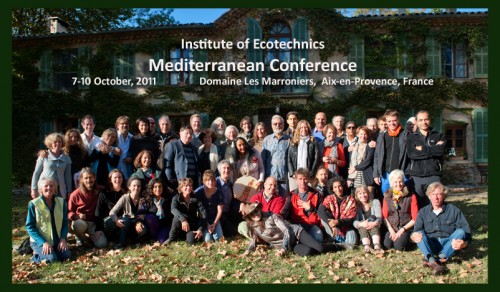
they built the biosphere in Arizona, did you ever hear about it? there is this big dome, and the idea was that it’s totally sealed, so they could see how to create a bio-sphere on Mars that would be self sustaining with oxygen and food
that sounds really great..
but then, his family somehow became more influential on him as he got older and he closed it all down one day, suddenly out of the blue, he just locked it all up and kicked them all out.
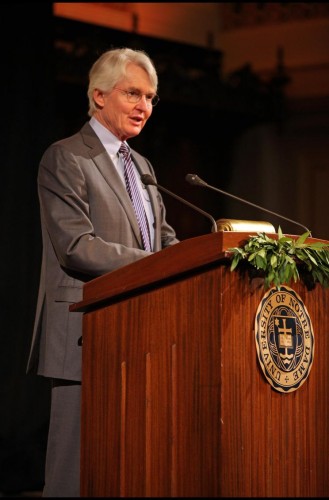
and the people who were in such kind of organizations back in the late 60s and early 70s, they weren’t dumb, they were really smart and intelligent people, for example The Source Family, there was a recent documentary..
oh yeah, we’ve met some of them, they’re great, we met some of them recently when the book [about the Process Church] came out through Feral house
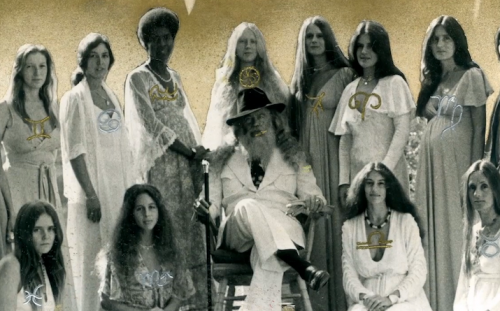
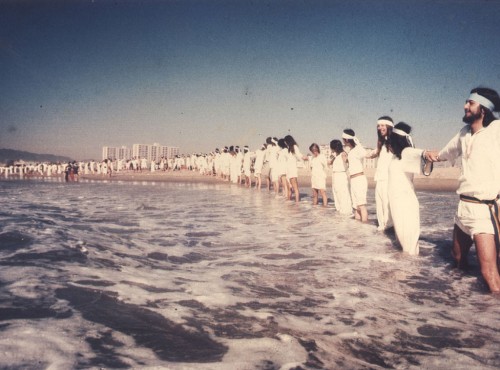
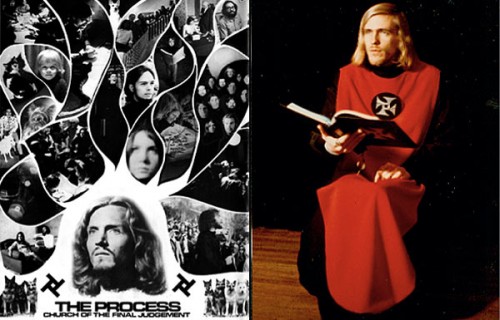
and some people who were in that organization [The Source Family], later they founded some IT companies, and became really rich..
yeah, exactly, and even with TOPY, there’s people even now, some of the central people have book publishing companies, record labels, other kinds of companies, computer companies, it’s amazing how much it did bring out the people’s innate genius, the genius factor, we like to call it, everybody has a genius factor, and those rigorous communal situations, some people just break down, cant do it and they leave, but those who work through it, tend to discover their gen-ius factor and really enhance the rest of their lives.
it’s all about people, it’s all about self-realization. Gen, you collaborated with a lot of strong per-sonalities, a lot of really great and significant individuals, but could you name some people, probably some young people from the recent generations, who were comparable to the «old he-roes», people of your generation?
most of the people in my generation have died, Derek Jarman is dead, Burroughs is dead, Gysin is dead, Timothy Leary is dead, even Lady Jaye..
sadly
but in terms of younger, say people in their late thirties that we’ve known.. Carl Abrahamsson, in Sweden in Stockholm who ran TOPY Scandinavia and then later on TOPY Europe, he has a book publishing company called EDDA, he’s an amazing person with a really strong mind. in Kathmandu in Nepal, there’s a friend of ours called Tri Lochan, who is a remarkable Shiva sadhu and mystic, and he knows someone who’s only about 30, the Sun Yogi, who has developed this whole system of feeding off sunlight and meditating on the sun.
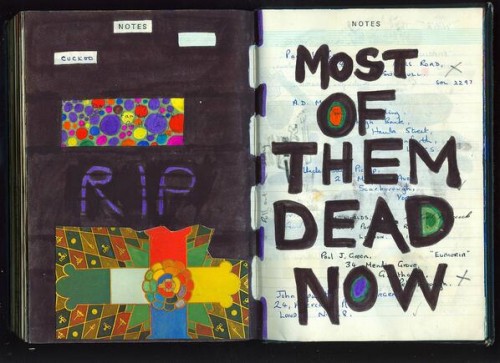
So there are still people here and there that we meet, amazing peo-ple, but all the people in Psychic TV, PTV3, are really special people. and it’s funny because now at last, we first wanted to make records when we heard the Rolling Stones, and then we started to make records in 67, but this band..
yeah, i’ve heard it, Thee Early Worm, it was great
yes, but this version of Psychic TV, this is the sound I’ve always heard in my head, and likewise the psychedelic records we’ve been making, and the concerts, it’s so exciting for me, that finally, 50 years later, i can finally hear what I’ve been hearing in my head then. and it’s a great feeling, to find that.. and channel that.
yes, so like a time machine, an open door..
and then we were just.. oh, yeah, here’s someone else, Hazel Hill McCarthy III, she was just Hazel Hill when we met, before she got married. we wanted to do the psychic bible, but we needed someone to design it, so we asked friends, «do you know anyone who designs books?» and they all said no, but this one girl, Kaly, said «i know a girl who helped me design my maga-zine», and we said «who is it?» and she said «it’s this girl Hazel, Hazel Hill» and so we rang her up and said «would you design the Psychic bible?», and she said «well, I’ve never designed a book, but i’ll try» and she did the most beautiful design of the hardback copy.
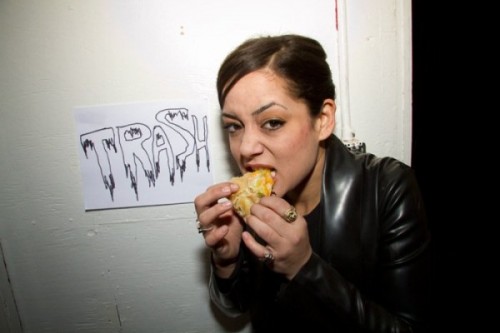
and we’ve become really good friends and one day she was visiting, last year, and she said Gen I found this amaz-ing photograph online of these voodoo priests in these incredible outfits and costumes and she showed me and immediately we go «oh my god, wouldn’t it be great to actually go there and see these and find out why they’re so weird, no one is allowed to show their face, and some of them are like boxes, almost for puppet shows, really bizarre outfits and really fantastic psychedelic colors and she said «well, why don’t we go?» and so we went «yeah, why don’t we go?» and then after a little while she rang me up and said «i want to do a documentary about you visiting Africa and meeting all these voodoo priests, would you come?» and i said «well, yeah, it’s something new, let’s go».
and so we went to Africa for the first two weeks of January this year, and the second day we saw this really interesting, really tall, 6 ft 6 man in the distance and immediately I said to hazel «i bet that’s the high priest», we just felt it, and it turned out he was the father of our guide and translator, Immanuel, and he is called Daah, and Daah is the head of all voodoo in Africa and Brazil, so on the second day we were already talking to the guy at the very top, and then he got all the other heads, they call them heads, not priests, all the other 5 heads to let us do interviews for the first time ever, and they allowed us to film rituals too.
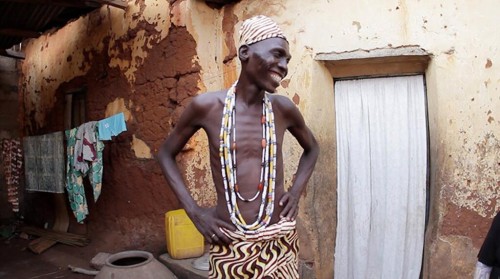
the first day he met me, Daah looks at me and suddenly goes: «you had a twin who died, and she should be linked with you forever, your soul should be linked forever, we should do a ritual and create you a Joumeaux», which is a little doll, that’s my twin, Lady Jay, so we did, and they allowed us to film this incredible ritual where he brought Lady Jayes spirit into the doll, so that we’re always in contact, and i’d take it everywhere with me, and it gets food when i eat and drink and so on. then, at the end of this visit, we discover that there was this whole culture about twins there, and when people saw my Joumeaux, my doll of Jaye, hanging round my neck, children would come up to it and touch it and pray to it and adults would all come up and bless it and touch it. and it was really fascinating, the power of it, and then a few weeks ago, Hazel rang me again and said: «guess what, Gen? they have a festival for just twins this year, in September, so this film that we are doing has turned into a story of you and LG and voodoo and this twin situation», the pandrogyne as we would call it.
and she said «we should go, the first weekend is for dead twins, the second weekend is for living twins». so she’s raising money and she’s taking us back. we had a really amazing film crew, so the quality is incredible and suddenly there’s a whole new story in my life about Africa and Benin, this tiny country to the west of Nigeria called Benin, which is the only country in the world where voodoo is the state religion, and has been for over ten thousand years, so it’s the oldest continuous religion anywhere, this is the earliest religion, probably, the mother religion
Gen, this is unbelievable, this is a truly amazing story, it’s so deep and beautiful, I realized I don’t have words, i cant describe it
so you just never know, you know? you think your life is winding down and everything is more or less as you might expect it, and suddenly – bang – you’re in the middle of this tiny country in Af-rica
just another universe, yeah? and it’s always been there
so you know, as they used to say, we go with the flow, there’s the adventure, let’s try, let’s see what happens, let’s find things out, as we were saying, in the very beginning, in the sixties, al-ways keep opened up, always be ready to change what you though you knew, to adapt and to expand and that’s what we try to do every single day
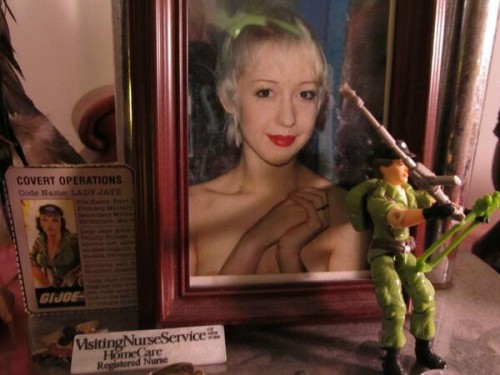
this is really great, really
it’s a beautiful way to live a life, it really is. we’ve been really blessed with our life, tragedies and all, it’s just.. so incredible and you said, you’re so wise, the world is a huge universe, and each individual is a universe, and their mind is a universe, there’s just so much here to explore and think about, the idea of the petty nature of economics and politics and war and ahh.. you know what? can’t they see how fabulous it is? there’s no need to get depressed and angry, because it’s incredible, if you just let go of thinking «what’s gonna happen next», of your expectations
yeah, just go, just travel and never stop, never expect anything
there’s a phrase that we were taught by a wise man, a map of how to think about each day: «no ex-pectation, no attachment, no judgement», and it sounds simple, but actually to really try and live like that, it’s not easy, it’s so easy to be attached to something and think.. whether it’s LJ, or my favorite book or whatever, just remember that it’s just fleeting moments, just stuff, that JAye is love, unconditional love, not the body, not the person, but this unconditional universal love that’s never gone, that’s everywhere, not judging people, not dismissing them because they are differ-ent, and not having expectations because if you think «oh, i like the way this person looks, i think i want to be their boyfriend or their girlfriend» and you have expectations and then they’re not how you imagined?
and then you’re disappointed or even angry and really it;s because you’ve been trying to impose an image on something that wasn’t what you imagined. and so much of our unhappiness comes from those three things: expectations, judgements and attachments.
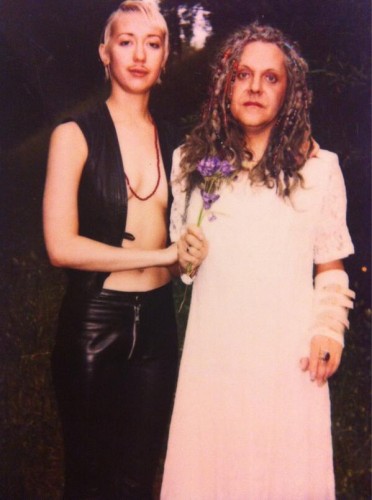
so, Gen, if you don’t mind.. let’s say the time machine takes us back to the 70s, could you tell me how and when you met Sleazy, Peter Christopherson? what person was he when you first met him?
COUM Transmissions were doing a series of ritual performances in an experimental theater called Oval House in Kensington in London, it was one of those places that always let us do whatever we wanted and at the end of one of those evenings, when we got somethings like 30 tape recorders, cassette recorders and put in a tape in each one and then just switched one on every 2 minutes till all 30 of them were all going out of sync with all sorts of sounds and noises and so on. and that was the piece of music, the piece of just experimental music. this young guy came up, slim, with a small mustache..
so, what year was that?
that would probably be 1970… late 74′. and he came up to us after the event we were packing up, and he said Genesis, my name is Peter and I believe you know William S Burroughs, and we said yeah, we do, he’s a good friend of mine, he said I’ve always wanted to meet WSB, do you think you could help me get in touch with him? so we said well maybe, we don’t really know who you are, but why don’t you come round and have a cup of tea and we get to know you and then yeah, probably we’ll just put you in touch with William. so he came round, and he was talk-ing about his sexual interests at some point, and after that he got his nickname Sleazy.
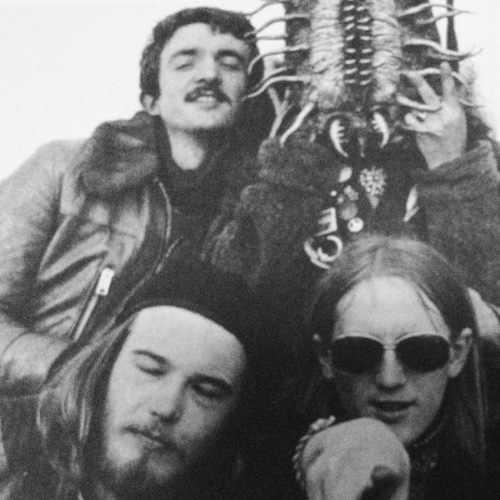
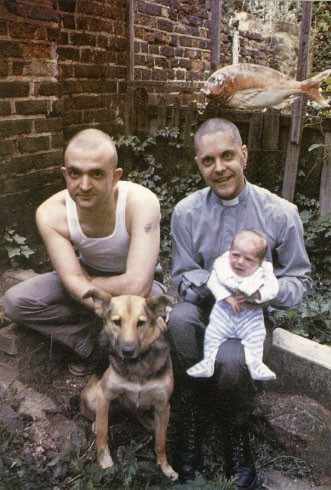
so that was the very first time you met him, and he got a name from you?
i think that was a lot of people, i called david tibet tibet
yeah, i’ve heard the story
because we knew several different Davids, and so he was at the time trying to learn and write Tibetan, so to make it simple when people said «who was that on the phone?» i said «Tibet»
so what about Geff?
Geff Rushton?
yes, did you call him Jhonn Balance or was it him?
no, no, he came up with it.. he was still in school, i think he was 15 or 16, when we met, he in-terviewed me for a fanzine that he had, and during the interview it dawned on me that he was gay, so we told Sleazy that we’ve met this really intelligent young guy, and he should take him under his wing and be his mentor
so it was actually you who introduced them to each other? this is incredible
so Sleazy came to see me, and he showed me the photos he’s been doing, those incredible photos of young boys in medical situations and looking as if they’d been beaten up, really enig-matic but somewhat disturbing to other people photographs which we loved, we thought they were great. so we wrote to William and we said we’ve met his guy who does really beautiful photos that i think you’d really like because they’re kind of «wild boys” in a way, so we put them in touch with each other, and William was releasing a book through a small independent press in California, and we got Sleazy to send William about 8 photographs, and originally they were going to be used as the illustrations in the book
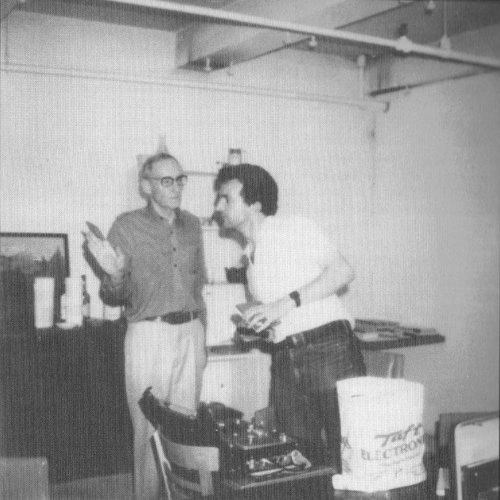
so what book was that?
we can’t remember, i’m afraid
yeah, okay
but in the end they didn’t get used, the publisher thought they were too disturbing so they didn’t get used, but from then on Sleazy also knew William to a degree, and we actually took Sleazy to meet William in 1981, first in New York and then in Lawrence, Kansas so we went to The Bun-ker and later we went to Kansas and catalogued all the tape recorder experiments which be-came the album «nothing here now but the recordings». so Sleazy got his wish and became an acquaintance of WSB, and also as a side effect he ended up in COUM Transmissions, and then Throbbing Gristle, and then Psychic TV, and then Coil after all
there was a great story, it was really deep and interesting and so multidimensional, about your meeting with William Burroughs back in the early 70s, i suppose, i’ve read it in the Psychick Bi-ble in the special chapter
and his hundredth anniversary this year, of course
so can you tell us something unusual about William? what kind of being was he? something that is not commonly known
we think we can probably do that. when we met William, of course we were around 20–21, and very over wrought because you could tell from the first sentence that he was this massively in-telligent man and he was very intimidating, we always felt scared that he’d suddenly wake up and realize i was dumb, and say «why am I talking to this idiot?» but that never happened, and so slowly, we got more comfortable with him, less intimidated by how special he was, and he always avoided mentioning feelings or emotions, he seemed very closed off emotionally, and that always disturbed me a little bit, that he had this piece of what we consider a really important aspect of our being, love, emotion, that that was kind of missing.
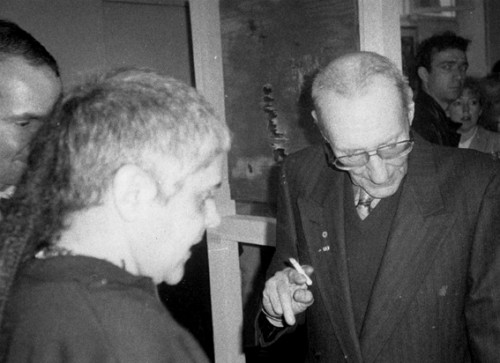
could you say that he was kind of a warrior in Carlos Kastaneda’s sense? you know, the way of the warrior, he often quoted him in his books.
well, he actually admitted, that he was into magic and so on, which, for a long time, nobody knew.
i mean, you wrote that your first question to William was «tell me about magick?»
magick, yeah, it’s true. but let me finish the other story first. so he was kind of closed of emo-tionally, and it worried me, a little, for him, just because his life.. there must’ve been something that made him really hurt, really sort of damaged and of course one day he was on the phone with me and Billy Jr, his son, has had a liver transplant, and William was in …. in Colorado, the Buddhist university, and Billy had just died, he had this transplant, but he carried on drinking and taking speed and he died, and when i rang up William he was crying and it was for the first time ever he was showing emotions saying how he hadn’t given Billy Jr the attention he should’ve had he hadn’t been a real father for him, he basically just abandoned him to other people to take care of
and he wanted to be like dad, shooting drugs and writing books about it..
so, you know he sacrificed Billy Jr, basically, to his need to be a writer, and of course, as you know he also shot his wife accidentally, and he mentioned this to me as well around about the same time, that day he was walking around Mexico City and he didn’t know why but he was just crying all the time, and he didn’t know what it was but he knew something terrible was going to happen, and it felt like he had no control over it at all and then of course the accident where he shot his wife has happened and he felt as if he was possessed by an evil spirit, the Ugly Spirit, as he called, so that turned out to be what made him closed off, because he really loved Joan, his wife, and he never got over the guilt of having killed her, but he shut it away because it would paralyze him and make him unable to write.
so that was when i realized that William does actually have emotions and it’s a good thing that he’s letting them through now. then, few years later, he died, and James Grauerholz who took care of everything in William’s life, business and personal, was in New York„ and he invited me to go see him, and he was staying in Allan Gins-berg’s old apartment in the East Village, so we went over, and James said I know how much you cared for William, so I wanted to tell you about what happened, when William died and he started to show me photographs of William on the last day and then we realized that it was William when he was dead and then there was a picture of William in his coffin and I really started to cry and it really hit me that he was gone.
but then James did something really beautiful, he said «but look at this Gen», and he showed me William’s diary and the last entry that he put in said something along the lines of «I realize now that it’s really just all about love»
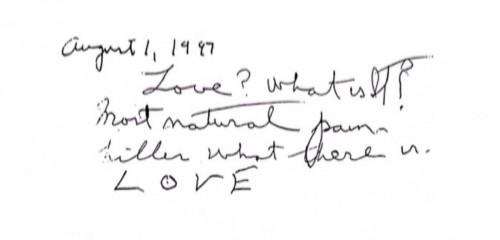
natural painkiller, yeah
and i started to cry even more, because I thought: «oh thank goodness William realized it was about love before he died, he finally let it back in»
that was such a powerful moment
yeah.. and so we just felt so relieved, that his spirit, his soul, his consciousness would be at peace. not sure if that fits what you;re asking
could you say that he was a magician?
oh yeah, we actually wrote a whole article about that, Magick Squares and Future Beats, because we noticed that people weren’t talking about it and yet Brion Gysin the first day we met talked about magic to me, and the first time we met William, we asked him about magic and he showed me his magical notebook and experiments and so on. and we even did an experiment together, in the bunker, where I had a real 8 wheel tape recorder and we both read this book by Konstantin Raudive about recording the voices of dead people on tape but not using a micro-phone, just having a crystal from a crystal radio instead of a mike, and this guy.. Eastern Euro-pean, maybe Latvian, actually, he found when he recorded without a microphone but left all the channels on record that he got white noise but in the noise he could here voices and those voices were saying things that were intelligible, so there’s a whole book by Konstantin … about there voices of the dead complete with the record of some of the recordings he made
yeah, he wrote an article about it
yeah, so then William and myself decided to see if we could repeat the experiment so we had this tape recorder we went to the bunker together and we sat down and we turned it on to re-cord without a microphone and we tried it and then we did it and we got a series of polaroids of that experiment with William standing listening to the tape recorder and then after about 2 hours he says to me «..nothing». «Nothing». so we didn’t get any voices but it was a funny day, we were both laughing afterwards
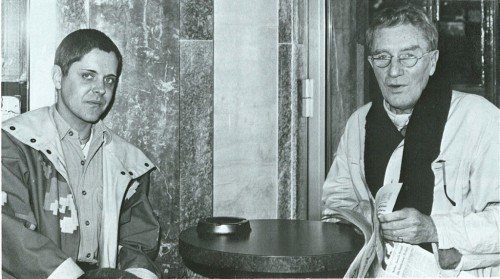
the interesting thing about the voices of the people who somehow realized themselves, who really had a kind of a power of art, a power of magic.. i feel that William Burroughs is still alive in his voice, you know when you are listening to his recordings, some extracts from his novels or especially the old cut ups from the 50s, from tangier
that’s true.. and also it’s an instantly recognizable voice, you know, two words and you know it’s William
I want to say that your voice also has a similar effect, different of course from William’s voice, but when I’m hearing your voice, it’s immediately recognizable that this is a man who is familiar with magic
thank you.. a lot of people have said that i have a very instantly recognizable voice too. who knows why, but yeah
it’s interesting, because the words, the materials from which we are building the worlds around us and the way we are pronouncing the words, it’s something like our personal tone, our per-sonal autograph
i see what you mean.. well, when we were hanging out with the eco technics people in London, they had a lot of work that they were doing based on Gurdjieff, they were interested in Gurdjieff, so we did a lot of Gurdjieff experiments, one of them was a Tibetan experiment, «finding your true voice» which we did a lot of.. basically being in front of a stone wall, so that you go up and down the scale sort of (mimicks sound) and find what actually starts to vibrate the air between the wall and you.
and just feeling that resonance with you and the world, yeah
so that’s one way.. one exercise that we did whether that had an effect or not.. but usually you discover that your true voice is deeper than the one you normally use
it’s just like names, the first thing that you begin your journey with, finding your true name, you talked a lot about it
yes, so Brion asked me «do you know your true name?» and we said «yes»
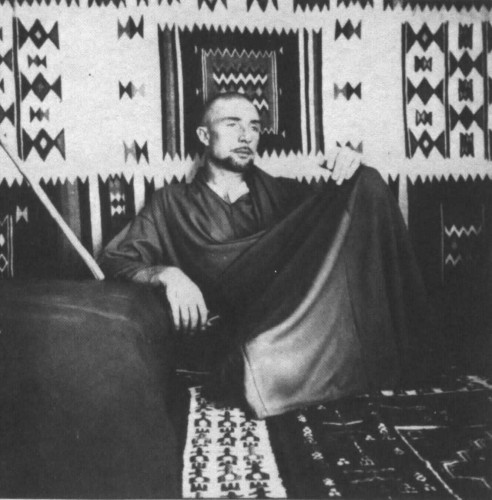
do you know what Brion Gysin’s real name was? i had some ideas that his real name would be Hassan‑i Sabbah
ha, that’s interesting, that’s very possible, very possible.. because William saw Brion as a rein-carnation of Hassan‑i Sabbah in some way, and dedicated so many books about them both, and in fact Brion was actually the person who told William about Hassan‑i Sabbah. and some-where we have a manuscript that Brion gave me just called a trip to Alamut.. perhaps it was ac-tually printed in Research or somewhere, or maybe its in «The Best of Brion Gysin». he was fas-cinated with Alamut and actually made a pilgrimage then.
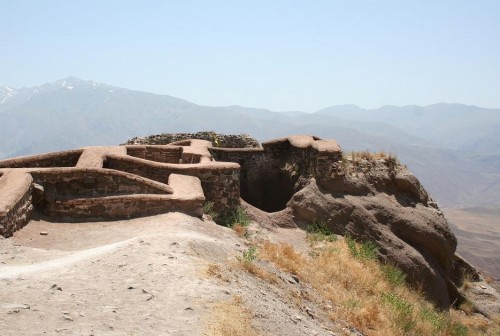
what advice could you give to people who are already running their own temporary autonomous zones all around the world? do these TAZ’s have a prospect in the modern world, in the future?
not sure I understand your question but..
i mean, we are here in Russia, in this very interesting situation where we are trying to construct something like this, i believe that you remember my dear friend Alexey, from the last gig in Mos-cow, the guy with the black hair and the golden apple, and they’re trying to do come kind of a commune here
as we were saying earlier, they’ve closed down so many strategies that used to make it more possible to set up alternative situations, they’ve made squatting illegal, they’ve made it illegal to give away food after closing time, when we were in Ho-Ho Funhouse in Yorkshire, that com-mune, we went to the baker’s every day and after 6 o’clock we could have as much bread and cakes as we wanted, we went to the cheese shop and we got all the broken cheese at the end of the day, we went to the butcher’s and we got as much the meat that we wanted free at the end of the day, so now they’ve made it illegal to give it to people so now it’s just destroyed, they used to have a law that if you squatted in a house they had to turn on electricity and now they don’t.
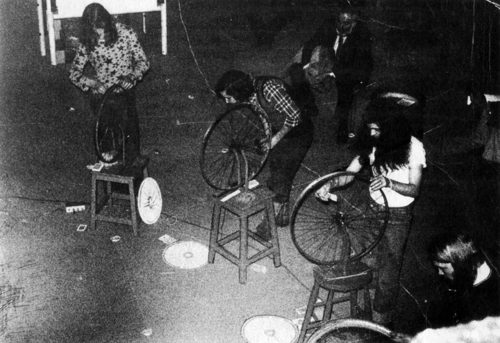
so lots of different things conspire that make it harder and harder and harder to find spaces in contemporary situations all over the place, it’s harder and harder to find people that have got enough money to share that money, as you were saying, so people have to constantly re-evaluate and strategize and then to take the risk of disappointment that it’s going to be in-credibly hard to maintain any kind of community in this current situation, the world everywhere is becoming more and more totalitarian as the fear of the future gets stronger
so, what would you say are the typical mistakes made by people who are trying to set up these kinds of communes?
i mean, we used to half-joke but also be serious and say communes fall apart in the bathroom and in the kitchen, because people don’t clean up, you know, we would to come downstairs in Ho-Ho Funhouse, and we would just manage to get enough food for the week, and we’d come down and it would all be gone, and we’d look at other people and say «where the fucking food for the week?» and we say «oh, we dropped acid and got the munchies so we’ve eaten it»
so not just discipline, but also responsibility for each other
yeah, responsibility for each other and a complete awareness of each others” needs, and that requires a lot of communication, it’s really good, like we said, to have a meal together, even every day, and talk through issues, to not hold things in, not have an attachment to a resent-ment about something, but to have a system in place where you can tell people issues that are concerning you or bothering you or irritating you without them thinking «oh, it’s an attack!», you know? and that means that you have to have incredible honesty, like we were saying, you have to say: «well, actually i think that i react the way i do because i was raped when i was 4 years old» or » because once i trusted somebody and they lied to me and betrayed me» and you have to learn to not have secrets, you have to share, even the most difficult things that have hap-pened to you emotionally, and that actually builds trust faster and deeper than any kind of hiding something or concealing issues.
and it’s not easy, people aren’t used to it, they’re not trained for that, we’re not educated to do it, in fact we are educated to be more selfish than ever, to think in terms of careers, to compete instead of to share, so.. there’s a whole complete realignment that has to take place in each individual and it has to be sincere, and any kind of secret just destroys things so fast.
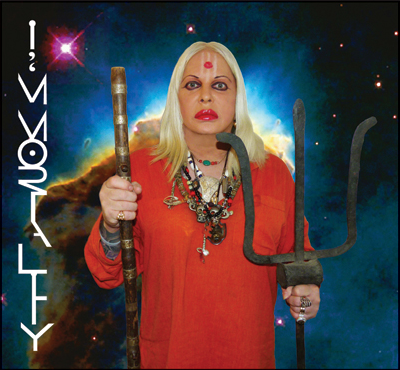
could you say that you were guided in some way by something external to this world?
we’ve often thought that when we met Lady Jaye, it was instant, we didn’t even know that she existed when we first saw her, we were just lying on the floor in this dungeon, woke up and saw this, to me, incredibly beautiful woman walk past the door, we were in this darkened room and she walked past the doorway where the room had a light, and we saw her for maybe 4 seconds, and we found, much to my surprise, that we were saying out loud, instantly, «dear universe, if we can be with this woman for the rest of my life, that’s all i want». and as we were saying that out loud, you know, «why am i saying that? i have no idea who that is».
and she was talking to somebody we couldn’t see and she started walking backwards and forwards across this door-way with a cigarette, and when she first came past, she was wearing what we recognized as 60s clothes, and she had this sort of Brian Jones blond bob, which obviously triggered a reac-tion in me, and then she started to get undressed and put on the dominatrix fetish clothing, leather and rubber and high heels, and she was still talking to somebody and afterwards she told me the person we couldn’t see was saying: «don’t go in there, there’s this really weird guy, this artist from England, that’s a friend of Terrence’s, and he’s bad news, he’s evil, don’t go in», and she’s thinking «ooh, it sounds fascinating, i want to meet him».
so when we got up and went out into that room, she immediately said «let’s go shopping», and she took me shopping and she tok me straight to a Tibetan shop, and bought Tibetan jewels and trinkets, and at the time we had dreadlocks, so she wove them into my dreadlocks, and then she took me to her apartment and dressed me in her clothes and they fitted me perfectly, and then she took me out to an S&M club and we just stood and talked and watched the slave auction and then at some point we suddenly looked down and the whole time we’d been standing there, she… there was a slave, a naked slave lying on the floor, and she was grinding the heel of her high heel shoe into his hand and we just thought «this is an amazing woman».. and as you were saying earlier, we’ve worked with all these incredible people, Leary and Burroughs and Gysin and Derek Jarman and so on.
but Lady Jaye turned to be thee most potent and remarkable of all, and after we were together, as a couple, one day we said to Jaye: «do you ever feel like we’ve been through this before and someone’s watching you? and it’s all unfolding exactly the same» and she said «yes, i have al-ways felt like that since i was a child» and we said «so have i» and we both had this really strong sense that we were reliving some connection.. and then she said something, another time, she said «you know, when i was a little girl, around 5 or 6, i was really unhappy at home and so i would run away in the evening and i would go to the graveyard where Harry Houdini’s grave is, and I would sit on Harry Houdini’s grave and talk to him», and she said «and then one day, i was just sitting there quietly, and i heard this voice, very distinctive voice», she said, and it was say-ing «don’t worry, i’m going to be with you and take care of you» and she said, «i’ve never told you this before, but when we met, i realized your voice was the voice i heard when i was a little girl»..
this is so beautiful. i think we should end the interview here, if you don’t mind.
that seemed like a good ending didn’t it?
yeah, it’s perfect, thank you so much, thank you for your time
you’re very welcome, and thank you for all the understanding and the interest you’ve given over the years and for the good questions..see you in Russia.
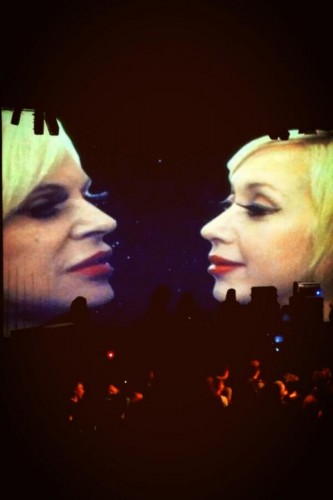
Thanks Nika Yorke for transcript!
See a cliff, jump off.
Дорогой читатель! Если ты обнаружил в тексте ошибку – то помоги нам её осознать и исправить, выделив её и нажав Ctrl+Enter.
One Comment